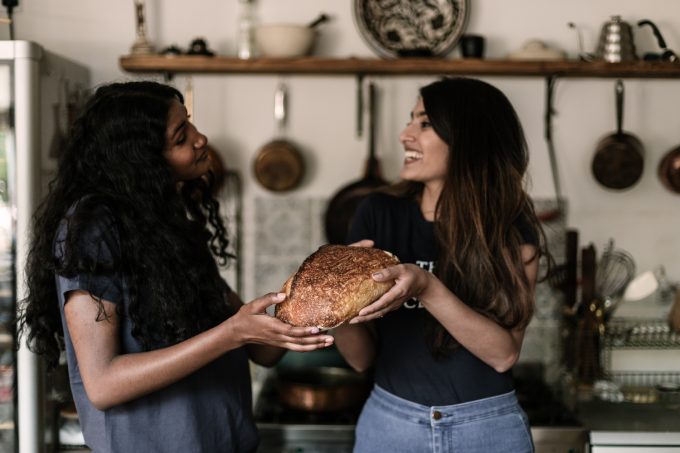Learning Objective
The "Bake One, Give One" principle has been in place from day one at The Sourdough School. This simple practice is far more than simply a nice thing to do.
The practice of bake two give one was created as is a powerful model for improving mental health through biochemical, psychological, and social pathways. Dr Kimbell noted, many years ago, that baking and the act of sharing bread empowers individuals to take control of their health, fosters community connections, supports sustainable farming practices, and reflects a holistic approach to well-being. By baking and giving bread, individuals not only enhance their own health and self-esteem but also contribute positively to the community and the environment, and this is why her books and recipes have always consitetnly given the quantities for two loaves or more.
This framework underscores the transformative potential of baking as a lifestyle medicine, demonstrating how simple acts of kindness and proactive health management can lead to profound improvements in mental and physical health.
It is always about a feeling.
In the video below Dr Ed Copley explains about the bake two, give one principle.
1. Introduction: The Power of Baking Bread
Baking bread is not just a culinary activity; Baking as Lifestyle Medicine is a powerful tool for improving mental health, fostering community, and promoting sustainable living. The “Bake One, Give One” initiative encourages individuals to bake two loaves of healthy, fermented bread: one for themselves and one to give away. This simple act has profound implications for mental health and community well-being.
2. Oxytocin and Cortisol: The Biochemical Benefits of Giving
- Oxytocin Production: Engaging in acts of kindness, such as giving away a loaf of bread, stimulates the production of oxytocin, often referred to as the “love hormone.” Oxytocin is associated with feelings of happiness, bonding, and trust.
- Cortisol Reduction: Elevated levels of cortisol, the stress hormone, can have detrimental effects on physical and mental health. Oxytocin helps neutralise cortisol, reducing stress and anxiety levels.
- Neurochemical Balance: The act of baking and giving bread creates a positive feedback loop, enhancing mood and overall mental health by promoting a sense of connection and reducing stress hormones.
3. Empowerment Model: Taking Charge of Health
- Proactive Health Management: Patients, particularly those socially prescribed baking as part of their therapy, often have histories of consuming ultra-processed foods. Baking healthy, whole-grain bread with diverse ingredients empowers them to take an active role in their health journey.
- Skill Development: Learning to bake provides practical skills and a sense of achievement. Mastery over the baking process boosts self-esteem and confidence.
- Positive Behavioural Change: By choosing to bake healthy bread, individuals shift their dietary habits away from ultra-processed foods, contributing to better physical health and enhanced mental well-being.

4. Psychological and Social Benefits
- Improved Self-Esteem: Baking bread and sharing it with others improves mental health through fostering a sense of accomplishment and purpose. It enhances self-worth and provides a tangible way to contribute to others’ well-being.
- Community Connection: Sharing bread builds community ties and combats feelings of isolation. It nurtures a supportive environment where individuals feel valued and connected.
- Therapeutic Experience: The process of baking is meditative and can serve as a therapeutic activity, reducing symptoms of depression and anxiety.
5. Environmental and Agricultural Support
- Supporting Sustainable Practices: By choosing organic, locally-sourced ingredients, participants support environmentally sustainable farming practices. This aligns with broader values of environmental stewardship and sustainability.
- Economic Empowerment of Farmers: Purchasing ingredients from local farmers ensures that money is reinvested in the local economy, supporting small-scale farmers and promoting agricultural biodiversity.
6. Reflection of Personal and Community Values
- Alignment with Personal Values: Baking and sharing healthy bread reflects a commitment to personal health, community well-being, and environmental sustainability.
- Mutual Benefits: Helping others by giving away bread creates a reciprocal relationship where both the giver and receiver benefit. The giver experiences improved mental health and satisfaction, while the receiver enjoys nutritious, home-baked bread.

